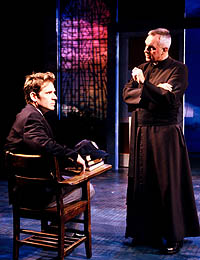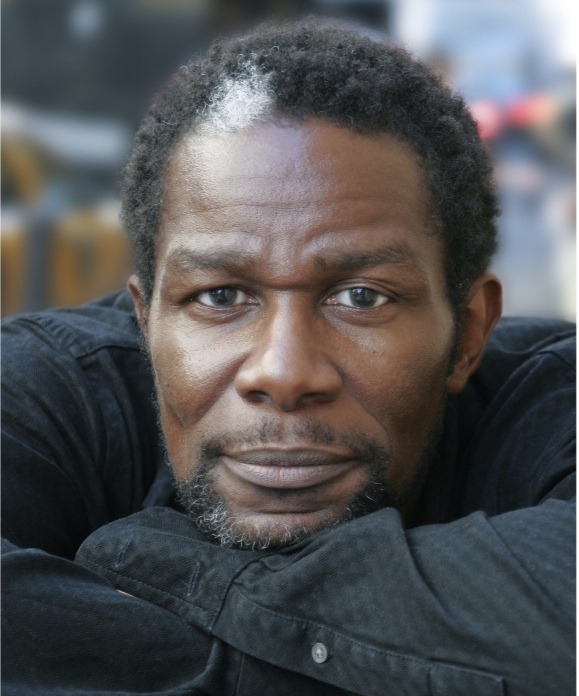 I reviewed two Shakespeare plays in last Friday’s Wall Street Journal. That piece was my five hundredth drama column for the paper. My first column, a review of David Ives’ Polish Joke, appeared on April 4, 2003, three months before I launched this blog. It was the first theater review I’d ever written, and it was an experiment: Paul Gigot invited me to try my hand at being a drama critic, and I said I was game.
I reviewed two Shakespeare plays in last Friday’s Wall Street Journal. That piece was my five hundredth drama column for the paper. My first column, a review of David Ives’ Polish Joke, appeared on April 4, 2003, three months before I launched this blog. It was the first theater review I’d ever written, and it was an experiment: Paul Gigot invited me to try my hand at being a drama critic, and I said I was game.
I think of myself as a lucky man, but that invitation may well have been the biggest and best piece of professional luck ever to come my way. I had no idea–none at all–that I would spend the next decade reviewing shows on and off Broadway and all across America, or that I had discovered, at the age of forty-seven and entirely by accident, what seems to be my vocation.
I didn’t realize in 2003 that drama criticism was the ideal line of work for a dilettantish aesthete with unusually wide-ranging artistic and cultural interests, since it allows you to make use of everything you know. Nor did I suspect that it would also prove to be an inexhaustibly interesting job. Two of New York’s senior drama critics warned me shortly after I made my debut in the Journal that I was bound to burn out sooner or later, most likely the former. It never happened. I still get excited every time the lights go down, and I learn something from every show I see.
One of the things I learned along the way, much to my surprise, was how to write a play. That, too, I owe to the Journal‘s willingness to take a chance on me–and vice versa. If you don’t learn something from seeing and writing about two or three plays a week, you’re in the wrong business.
It’s helped–a lot–that Eric Gibson, Barbara Phillips, and Adrian Ho, my longtime editors, are perfect colleagues, helpful and knowledgeable and unfailingly supportive. If my reviews are worth reading, they deserve much of the credit.
In case you’re curious, this is what I wrote about Polish Joke nine years ago. Who knew?
* * *
Anyone, so the saying goes, can write the first act of a play–it’s the last act that does you in. David Ives has heretofore finessed this problem by specializing in one-act comedies in which he pulls the rug of reality out from under his hapless characters and watches with glee as they stagger and lurch. By his own admission, he is “not very fond of writing full-length plays,” and though two evenings of his surrealistic sketches, “All in the Timing” and “Mere Mortals and Others,” have had solid off-Broadway runs, he’s never had much luck with more ambitious projects. Now, though, Mr. Ives’ luck is about to change, for the Manhattan Theatre Club’s production of “Polish Joke,” a two-act play about the misadventures of a self-hating Polish-Catholic seminarian from the south side of Chicago, is pulverizingly funny from snout to tail.
“Polish Joke,” which opened Tuesday at City Center’s Stage II, is a fresh take on one of the oldest of theatrical themes. Second-generation American immigrants have been grappling on stage and on screen with the question of assimilation ever since “Abie’s Irish Rose,” and Jasiu (Malcolm Gets), who is struggling to break free from the stranglehold of his heritage, is cut from broadly similar cloth. Warned by his godfather (Richard Ziman) that “all Polish jokes are true” and that the only way for a Pole to get anywhere is to “impersonate somebody who is not Polish,” he changes his name to John Sadler, drops out of the seminary to become a novelist, dates a rich Jewish girl (Nancy Bell), even tries to pass himself off as Irish. Naturally, none of it works, and Jasiu finally learns that the only thing worse than being Polish is trying to pretend you’re not.
Described this way, “Polish Joke” sounds rather like “My Big Fat Greek Wedding,” only with an IQ of 200. But instead of turning out a conventionally carpentered three-act Problem Play, Mr. Ives has structured his loosely autobiographical tale as a series of related sketches, a set of picaresque variations on a comic theme–and it works, not least because of his uncanny ear. I laughed so hard at Jasiu’s encounter with a cliché-spewing Irish travel agent (Nancy Opel) that I thought I might rupture myself: “Sure, isn’t the breeze today as fine and lovely and grand and blessed as the first good fart after a plate o’ cooked cabbage?”
 It isn’t news that Mr. Ives is funny. What is surprising about “Polish Joke” is the sustained intensity of its heartfelt moments, especially the vignette in which Jasiu tells his urbane priest-professor (Walter Bobbie) that he has lost his vocation and is dropping out of the seminary. Typically, Mr. Ives detonates one of the show’s biggest punch lines in mid-scene. Asked if he ever had any doubts about his own calling, the priest replies, “Well, there are those Saturday nights when it’s just you and the pastor singing ‘The Mikado’ together in the rectory. Times like that you start to wonder.” (Mr. Bobbie puts a wicked spin on this line.) But instead of shying away from the emotion of the moment and vanishing into an inky cloud of one-liners, Mr. Ives plays it to the hilt, screwing up the tension in such a way as to leave no doubt of his underlying seriousness of purpose. For “Polish Joke,” like every first-rate comedy, is really about the human condition–the ethnic joke as metaphor for man’s fate–and the louder you laugh at its verbal skyrockets, the closer you’ll come to crying at evening’s end.
It isn’t news that Mr. Ives is funny. What is surprising about “Polish Joke” is the sustained intensity of its heartfelt moments, especially the vignette in which Jasiu tells his urbane priest-professor (Walter Bobbie) that he has lost his vocation and is dropping out of the seminary. Typically, Mr. Ives detonates one of the show’s biggest punch lines in mid-scene. Asked if he ever had any doubts about his own calling, the priest replies, “Well, there are those Saturday nights when it’s just you and the pastor singing ‘The Mikado’ together in the rectory. Times like that you start to wonder.” (Mr. Bobbie puts a wicked spin on this line.) But instead of shying away from the emotion of the moment and vanishing into an inky cloud of one-liners, Mr. Ives plays it to the hilt, screwing up the tension in such a way as to leave no doubt of his underlying seriousness of purpose. For “Polish Joke,” like every first-rate comedy, is really about the human condition–the ethnic joke as metaphor for man’s fate–and the louder you laugh at its verbal skyrockets, the closer you’ll come to crying at evening’s end.
The five-person cast, egged on by director John Rando, tears through the script like a bullet train, and the effect is crisp and exhilarating. Mr. Rando, of course, won a Tony last year for “Urinetown,” which I happened to see for the first time a few weeks after 9/11. I still remember the rush of relief I felt as I shook off my fears and surrendered myself to that delicious show. New Yorkers were sorely in need of laughter back then, and I dare say they will need it no less in the coming days, for which reason we owe a great debt to David Ives. Alas, “Polish Joke” is set to play only through April 20, so go while you can–but cross your fingers. The Manhattan Theatre Club has a good thing going, and I hope they change their minds and let it run and run and run.
Archives for May 2012
TT: Lookback
 From 2005:
From 2005:
I moved to New York twenty years ago this month. It never occurred to me as a young man that I would someday live here, and I’m still capable of being taken aback by the improbable fact that I do. Just the other day I was riding across the Brooklyn Bridge in a cab, and as I glanced out the window at the skyline of lower Manhattan, the city suddenly looked strange to me, as if I’d never seen it before. Perhaps you can never feel completely at home in a city to which you move at the ripe old age of twenty-nine….
Read the whole thing here.
TT: Almanac
“Whenever people agree with me, I always feel I must be wrong.”
Oscar Wilde, Lady Windermere’s Fan
TT: Yes, The New Yorker
 Alec Wilkinson, a protégé of William Maxwell whose New Yorker articles have long been one of the very best reasons to read that magazine, has now written a profile of John Douglas Thompson, who is currently appearing in the Goodman Theatre’s revival of Eugene O’Neill’s The Iceman Cometh and will be starring later this summer in my own Satchmo at the Waldorf.
Alec Wilkinson, a protégé of William Maxwell whose New Yorker articles have long been one of the very best reasons to read that magazine, has now written a profile of John Douglas Thompson, who is currently appearing in the Goodman Theatre’s revival of Eugene O’Neill’s The Iceman Cometh and will be starring later this summer in my own Satchmo at the Waldorf.
Not at all surprisingly, the piece, which is called “Stage Secret,” is first rate, and it includes a vivid and accurate account of the day that I took John to the Armstrong Archives to listen to Satchmo’s private tapes for the first time. It also contains this amusing confession:
Thompson is a little nervous about playing a man who was so widely known, “because people might judge me on my ability to portray him as they recall him,” he says. “When you don’t look like him, you don’t sing like him, and you don’t play the trumpet like him, then, yeah, I got a lot to worry about.”
I’m not worried.
I should point out, however, that the profile does contain a small but significant error that somehow escaped the notice of the magazine’s vaunted fact-checking department: John is not “creating” the double role of Louis Armstrong and Joe Glaser. That was done last September by Dennis Neal, who starred in the first professional production of Satchmo at the Waldorf in Orlando, Florida, giving a wonderful performance that I will never forget.
If you subscribe to The New Yorker, you can read “Stage Secret” on line by going here. Otherwise, you’ll have to buy a copy of this week’s issue.
UPDATE: I just heard from the relevant person at The New Yorker, who wrote to apologize for the error. “The checker on that piece is new and didn’t know the theatrical meaning of ‘creating’ a role,” he told me. I’m impressed that I received so prompt a response.
TT: In the midst of life
The world keeps on turning, no matter what may happen to you or your loved ones. A week ago tonight I was in Smalltown, U.S.A., mourning the loss of my beloved mother, instead of New Haven, Connecticut, where I’d planned to be present at the public announcement of Long Wharf Theatre‘s 2012-13 season. I don’t usually attend such ceremonies, but this one was different, for it was in part a celebration of the news that Satchmo at the Waldorf, my first play, will be transferring directly to Long Wharf after completing its run at Shakespeare & Company in Lenox, Massachusetts.
 The production, starring John Douglas Thompson and directed by Gordon Edelstein, kicks off Long Wharf’s 2012-13 season, the first in its newly remodeled theater complex. Previews start on October 3. The show opens on October 10 and runs through November 4.
The production, starring John Douglas Thompson and directed by Gordon Edelstein, kicks off Long Wharf’s 2012-13 season, the first in its newly remodeled theater complex. Previews start on October 3. The show opens on October 10 and runs through November 4.
Regular readers of my Wall Street Journal drama column will know that I am a longtime admirer of Long Wharf (whose artistic director, not coincidentally, is Gordon Edelstein). It is a tremendous honor for Satchmo at the Waldorf to have been chosen to open the season there. It pleases me greatly that I learned about Long Wharf’s plans in time to tell my mother, who was no less pleased for me.
Here’s what I would have said had I been in New Haven:
I’d say this was a dream come true, except that I never dreamed of any such thing. To get to work with Gordon and John, and to have my show produced at Shakespeare & Company and Long Wharf Theatre, goes far beyond anything I ever imagined for Satchmo at the Waldorf. It’s like Benjy Stone says in My Favorite Year: “You don’t get years like that anymore.” Only I’m getting one–and I still can’t quite believe it.
Watch this space for further details.
TT: On the road again
 Mrs. T and I returned to New York on Friday, and on Sunday we flew to San Francisco, there to begin a two-week-long reviewing trip in California. We’ll be driving down Highway 1, seeing shows in various parts of the state.
Mrs. T and I returned to New York on Friday, and on Sunday we flew to San Francisco, there to begin a two-week-long reviewing trip in California. We’ll be driving down Highway 1, seeing shows in various parts of the state.
I plan to post from time to time, but I’m not yet in the mood to restart full-scale blogging activities (except for the usual almanac entries, videos, and theater-related postings, which resume today after a week of mourning). This is as close to a vacation as Mrs. T and I will be getting this summer, and we need it.
Many of you have sent us messages of condolence in recent days. I’ll answer them in due course, but for now I simply want to say that they mean more to me than you can possibly imagine. My humble thanks for your concern.
TT: Just because
Boris Karloff is profiled by Ralph Edwards on This Is Your Life:
(This is the latest in a series of arts-related videos that appear in this space each Monday and Wednesday.)
TT: Almanac
“The truth is rarely pure, and never simple.”
Oscar Wilde, The Importance of Being Earnest
